Comparative Cultural Psychology
An introduction for students and teachers
How do minds influence cultures?
How do cultures influence minds?
Welcome!
Welcome to the OpenEvo TeachingBase collection for the Department of Comparative Cultural Psychology, at the Max Planck Institute for Evolutionary Anthropology. This page is designed for secondary school students, undergraduates, and teachers with an interest in psychology, as a broad introduction and orientation to the approaches in this field of study.
Here, you will find resources to learn about the core concepts, theories, methods and insights by our department to understand the cognitive (i.e. ‘mental’) and cultural capacities of humans and non-human primates around the world.
Explore by scrolling through the resources below, or use the buttons on the right to quickly navigate to your interests.
Introduction
The Department of Comparative Cultural Psychology (CCP) combines approaches from developmental, cross-cultural and comparative psychology, to study uniquely human cultural diversity and the universal cognitive mechanisms that enable and constrain it.
- We study the interaction between human cognition and culture by studying individuals in different social and physical environments around the world.
- We study uniquely human cognitive processes by comparing humans with other great ape species.
- We study similarities and differences in cognitive development and their inter-individual and inter-cultural drivers in human and non-human great apes.
CCP is not just a department, but a broader perspective on how psychologists should approach the study of diverse minds.
CCP emphasizes the need to work towards a more integrated understanding across three core sub-disciplines of psychology:

Comparative Psychology
How are the minds of non-human animals, and particularly, non-human primates, both similar and different to the minds of humans?

Cross-Cultural Psychology
How are the minds of humans similar and different across diverse cultures? What is the role of culture in shaping how humans think and behave?

Developmental Psychology
How do the minds of individuals change over our lifetimes? How do these changes vary in relation to our cultural environments?
Big Questions
CCP suggests that we ask big questions about the diversity of humans and non-human primates, and look at a wide range of cognitive, behavioral, and cultural phenomena related to these questions.
- To what extent are any cognitive-behavioral capacities universal across all primates? great apes? humans?
- To what extent do diverse non-human primates exhibit culture?
- What exactly is unique about our human capacities for cultural learning?
- How do human social and cultural environments influence our cognitive development?
- How individual or cultural is the variation in human patterns of cognition and behavior?
- How does human cognitive development influence our cultural capacities?
Lesson collection
We continuously work with scientists in the department of Comparative Cultural Psychology to develop teaching materials around past and current research topics.
Some of these resources are produced by motivated students and pre-service teachers as part of project or thesis work.
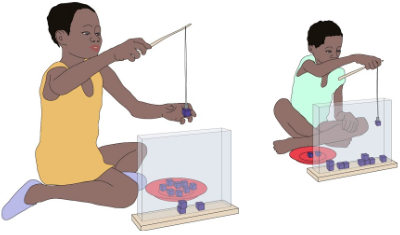
“Fair” does not always mean the same thing
These lesson materials introduce students to issues of fairness and various interpretations of it. Reflecting on results of a cross-cultural experiment with children, students discuss how we can use our understandings to create a more fair world.

Chimps or children – who is better at sharing resources?
A comparative behavioral research experiment exploring the abilities of chimpanzees and of children to cooperate around a shared resource.
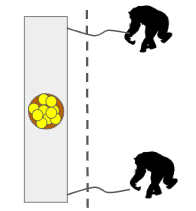
Worksheets: Cooperation experiments with chimps and bonobos
In a series of experiments, anthropologists wanted to find out whether chimpanzees and bonobos work together and share a common source of food. Results tell us something about the role of social tolerance in cooperative foraging.
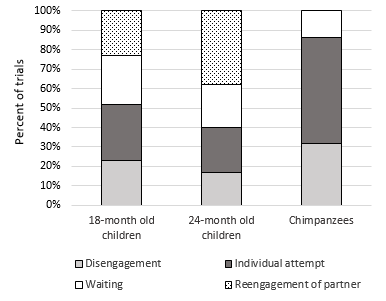
Cooperative activities with children and chimpanzees
A series of experiments with small children and chimpanzees to investigate their ability and motivation to engage in collaborative activities
Lesson materials in development
The following are some examples of research topics and publications that we are planning or actively working to develop into accessible teaching materials.
- Hanus, D., Truppa, V., & Call, J. (2023). Are you as fooled as I am? Visual illusions in human (Homo) and nonhuman (Sapajus, Gorilla, Pan, Pongo) primate species. Journal of Comparative Psychology, 137(2), 80–89. https://doi.org/10.1037/com0000326
- ManyPrimates, Aguenounon, G., Allritz, M., Altschul, D., Ballesta, S., Beaud, A., Bohn, M., Bornbusch, S., Brandão, A., Brooks, J., Bugnyar, T., Burkart, J., Bustamante, L., Call, J., Canteloup, C., Cao, C., Caspar, K., Da Silva, D., De Sousa, A., … Zablocki-Thomas, P. (2022). The Evolution of Primate Short-Term Memory. Animal Behavior and Cognition, 9(4), 428–516. https://doi.org/10.26451/abc.09.04.06.2022
We encourage interested students and educators to connect with us if you want to get involved in developing educational resources in this space.
Core Concepts
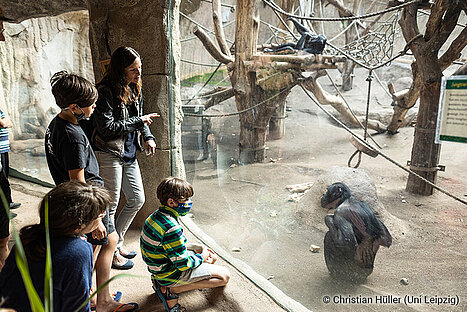
Engaging the big questions of CCP helps to illuminate higher, organizing concepts for understanding the full diversity of human and non-human primates.
Learn about some of the core concepts of our department below.
Core cognition is all about how our brains understand and make sense of the world around us. Scientists study how we understand things like numbers, objects, space, and other people. We also look at how we think about ourselves and how we can use our knowledge to make decisions. We want to understand how these abilities develop in humans and how they compare to other animals like great apes.
- Spatial cognition: The mental processes involved in perceiving, understanding, and navigating through space.
- Analogical reasoning: Drawing similarities between different situations or concepts to make inferences or solve problems.
- Numerical cognition: The cognitive processes involved in understanding quantities and probabilities.
- Metacognition: Awareness and control of one’s own cognitive processes, such as monitoring and regulating learning.
Social cognition is all about how we understand and interact with other people. Scientists study how we can figure out what others are thinking and feeling, and how we use that information to guide our own behavior and communicate with them. They think that this ability is what makes humans different from other animals and allows us to learn from each other and work together. We study how we understand things like what others see, know, want, feel, and believe, and how we use that understanding in social situations. We also look at how our ability to understand others is different from or similar to great apes, and how our social and physical environment affects our social skills.
Theory of mind: The ability to understand and attribute mental states, such as beliefs, desires, and intentions, to oneself and others.
Perspective-taking: The cognitive process of imagining oneself in another person’s position and understanding their point of view.
Hyperactive agency detection: The cognitive bias to percieve faces, purposes, or agents, even when there are none present.
Social learning is the process of learning from others by observing their actions and behaviors. It’s how we acquire knowledge and skills by watching and imitating others. Scientists study how both humans and animals figure out what information is important in social interactions, who they prefer to learn from, and when they choose to follow what the majority is doing. We want to understand how humans learn socially, what we have in common with other animals like great apes, and how our environment affects our learning strategies.
- Social preferences: Individual preferences for specific individuals as sources of information or models for learning.
- Selective trust: The ability to determine which individuals are more reliable and trustworthy sources of information.
- Social conformity: The tendency to adjust one’s beliefs or behaviors to match those of a social group.
- Overimitation: The tendency to imitate all aspects of a model’s behavior, even when some actions are unnecessary or irrelevant to achieving a goal.
- Teaching: The deliberate transmission of knowledge or skills from one individual to another, with the intention of facilitating learning.
Core Methods
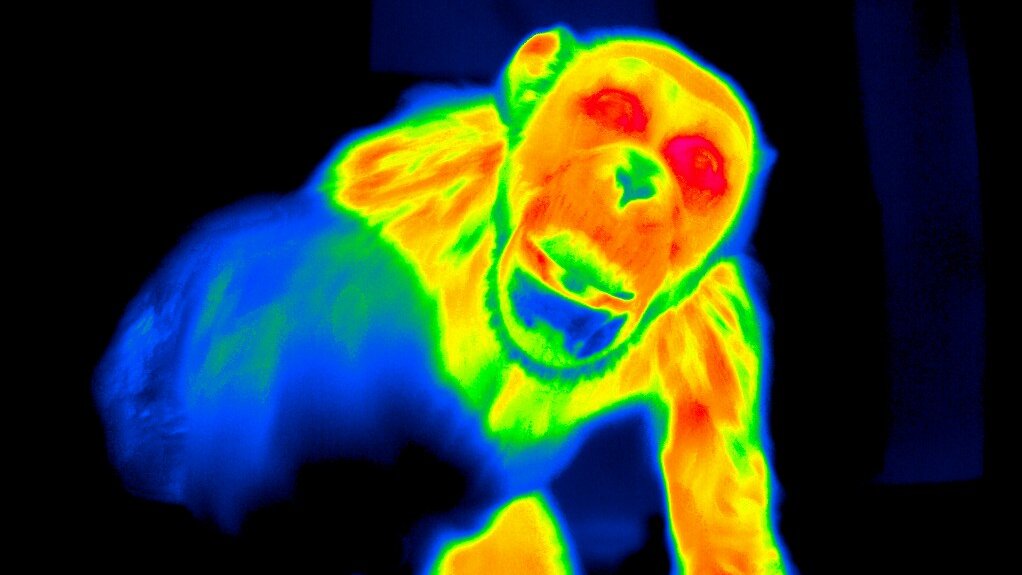
Engaging the big questions of CCP requires the use of cutting edge innovation in scientific, technological, and statistical methodologies.
Learn about some of the tools of our department below.
Emerging technologies and advances in computer science are enabling a revolution in opportunities for how psychologists can measure and understand the biological, cognitive, and behavioral dimensions that constitute human and non-human primates.
- Thermal imaging: cameras that can detect heat, and thus blood flow, in organisms (see image above), enable a non-invasive way to understand how environments influence cognition and behavior.
- Virtual Reality: many are familiar with virtual reality for humans, or 3D gaming environments. These same technologies can enable new research opportunities regarding how non-human primates behave and navigate in relation to virtual worlds.
- Machine vision: many are familiar with advances in machine vision through popular technologies that drive automated cars and even everyday face detection on phones. These same technologies offer new opportunities for psychologists to measure and understand organisms in their environments.
- Eye-tracking: like above, some may be familiar with eye-tracking technology through home-computer technologies, e.g. used in gaming. These same technologies can be used to explore how organisms are noticing or paying attention to elements in their environment.
Experiments are a foundational engine of psychological research and insight. Only through carefully designed studies and comparisons, can we come to understand why and how the full diversity of primates exists in our world as we and they do.
Example experimental paradigms
- Mirror Self-Recognition paradigms
- Touchscreen paradigms
- Optical Illusion paradigms
- Social behavior paradigms
While it is possible to engage in scientific research as individuals, scientific culture has always been a collective enterprise. It is best done in groups, and bigger groups may enable new opportunities for understanding our world.
Because CCP requires us to ask big questions, it also requires cooperation and collaboration with a rich diversity of scientific disciplines, institutes, networks, zoos, schools, communities, and individuals around the world.
In this regard, our department supports multiple such networked projects.
Non-human primate networks:
- GrApeNet: a network of great ape research facilities which enables collaboration on non-invasive research projects in zoos
- ManyPrimates: a network of primate researchers that enables broadly cross-species research projects.
Developmental psychology networks:
- ManyBabies: a collaborative project for replication and best practices in developmental psychology research
- Global Child Study Network
Wolfgang Köhler Primate Research Centre

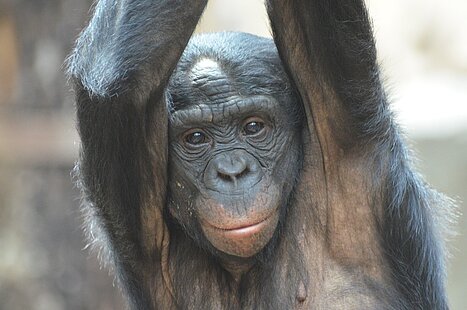
At the Wolfgang Köhler Primate Research Centre (WKPRC) an international team of researchers explore the behaviour and the underlying cognition of four primate species. Particular interest is directed towards the psychological development of the individual apes and the resulting differences and similarities between the species.
Learn more at their official page, or see if our staff can accomodate your school group.
Please note, our availability to offer school tours varies and may be limited.
Disclaimer: some text on this page was generated from, revised with, and/or adapted from a Large Language Model for the purposes of creative generation and language clarification. All text is under review and subject to expert revision as appropriate.

